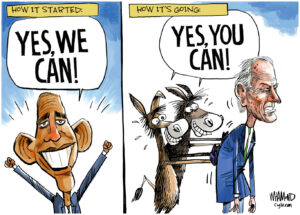The Battle to Define the New Health Care System
Barring astoundingly self-defeating behavior by Democrats, a decent bill will get to Obama's desk Whether lawmakers are rewarded or punished for their efforts will largely be decided in the coming weeks.
The next health care fight has already started. It’s the battle to define the bill that President Obama will eventually sign as a victory for consumers, taxpayers and the common good.
You might say this view is premature. Legislation has yet to pass the House or the Senate, there are differences between the two bodies, and some moderates still have doubts.
But barring astoundingly self-defeating behavior by Democrats, a decent bill will get to Obama’s desk. He and his party will then own the most sweeping reform of the American social safety net since the passage of Medicare in the 1960s and, arguably, Social Security in the 1930s.
Both parties know this. That’s why much of the rhetoric you’ll hear in the coming weeks will not really be about whether to pass a bill. It will be designed to shape how the voters who will decide the 2010 elections — and, ultimately, the fate of health care reform itself — come to view the new system.
Republicans will try hard to minimize the benefits that will flow from the reform and set themselves up to claim that anything bad that happens to anyone’s health care in the next few years is Obama’s fault. It will be a bit like those New York City taxi drivers during the late 1960s and early ’70s who despised Mayor John V. Lindsay so much that they were prepared to blame him for bad weather.
And since most of the changes don’t become effective until 2013, the next few years will be a time of uncertainties and unknowns. Citizens typically want to know what’s in this for them, and what they’ll get right now.
That’s why the most important document House Democrats released last week when they unveiled their bill was a list of 14 benefits that will be created immediately.
These include insurance reforms to ban lifetime limits on coverage and an end to “rescissions” under which insurers abruptly nullify patients’ policies after they file claims. One of the most popular reforms in the bill — barring insurers from denying coverage to those with pre-existing conditions — doesn’t take effect until later. So the House bill creates an interim high-risk pool to help those who need coverage in the meantime.
There are also particular benefits for Medicare recipients, including an immediate reduction in drug costs, and a very popular provision that would allow parents to keep their children on the family health plan through age 26.
Especially important are new investments in community health centers and in efforts to increase the number of primary care doctors. As millions more people get access to decent care, the system will have to provide more doctors, nurses and facilities to treat them.
“People will be excited about 2013,” said Rep. George Miller, chairman of the House Education and Labor Committee, which shares jurisdiction on the health care bill. “But there are enough benefits between now and then to keep them engaged and to keep them favorably disposed.”
The key word here is “excited,” and the central task of supporters of health care reform is to elevate the discussion to the central question at stake: Will the United States join all the other wealthy democracies in providing nearly everyone with health insurance? Or will we kick away the opportunity?
Miller focuses on how much needless anxiety a guarantee of health insurance will lift from the average family. “Right now, when you lose your job, you also lose your health care, your ability to send your kid to college, and sometimes your home,” he says. Knowing that health coverage will always be there doesn’t solve all those problems but it removes a heavy burden.
While negotiations between the two houses will be difficult, my hunch is that they could be less challenging than many are predicting.
For example, the two houses could split their differences on financing by including a scaled-back version of the Senate’s tax on high-end health plans while reducing the House’s tax on millionaires. Some of the Senate’s cost controls could be added while preserving the House’s more generous approach to coverage. And a public plan will survive because it’s an option most Americans understand and want.
Above all, the negotiators need to know that if they make the process look like a very bad day at the sausage factory, they will undermine public confidence in the outcome. From now on, they are not simply enacting a bill. They are rolling out a product.
E.J. Dionne’s e-mail address is ejdionne(at)washpost.com.
© 2009, Washington Post Writers Group
Your support is crucial…With an uncertain future and a new administration casting doubt on press freedoms, the danger is clear: The truth is at risk.
Now is the time to give. Your tax-deductible support allows us to dig deeper, delivering fearless investigative reporting and analysis that exposes what’s really happening — without compromise.
Stand with our courageous journalists. Donate today to protect a free press, uphold democracy and unearth untold stories.






You need to be a supporter to comment.
There are currently no responses to this article.
Be the first to respond.